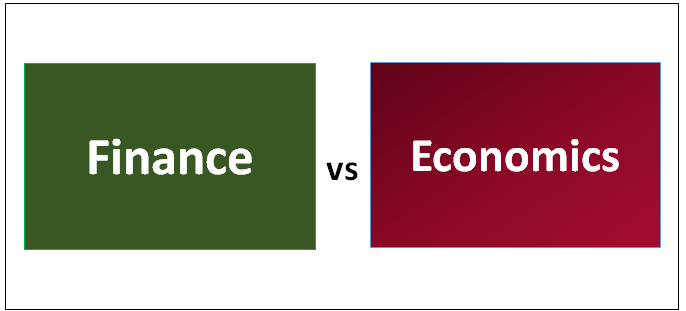Updated November 7, 2023

Difference Between Finance vs Economics
In Finance vs. Economics, finance includes studying and managing money-related aspects like assets, investments, financial institutions, etc. On the other hand, economics explores how individuals, businesses, and governments make decisions about the production, allocation, distribution, and usage of goods and services.
Economics as Studies and Career
As mentioned earlier, Economics as a subject throws light on the policies of the government of any country. It governs the working of banks and financial institutions and acts as a governance framework for the country. Economics is the backbone of a country’s financial network, supporting the smaller aspects of finance. While Finance deals with smaller day-to-day concepts, Economics subject deals with topics like economic policies, exchange rate movements, demand and supply of products, GDP (Gross Domestic Product), Inflation, Index movements, etc. Therefore, Economists analyze market money movement, demand and supply theories for industries, and the impact of monetary policies on commodity and product prices.
“Macroeconomics” studies smaller subjects of Economics and “Microeconomics”. Microeconomics deals with issues like the effects of demand and supply in a particular industry and the effects of bigger economic changes. Macroeconomics works on a broader level. It targets topics like GDP, inflation, interest rates, and their influence on the economy as a whole.
Finance in Studies and Career
Finance enlightens readers about the money cycle and how to participate in the market for optimal financial gains. A more in-depth and thorough examination of the various marketable items used to transfer money is provided by finance. It gives us information about the various investment channels to optimize profits. The major finance study groups are “Corporate Finance” and “Personal Finance”. While corporate finance helps to understand the finances of a corporation, company, institution, or any particular organization and industry, personal finance helps an individual to understand and manage his finances.
Finance vs Economics Infographics
Below is the top 7 difference between Finance vs Economics
A Key Difference Between Finance vs Economics
Both Finance vs Economics are popular choices in the market; let us discuss some of the major Differences Between Finance vs Economics:
- Both Finance vs Economics deal with commerce.
- Thus, Finance and Economics explain money movement in the market within their respective scopes.
- In understanding the effects of an outcome, both Finance and Economics fields work on the same theories of commerce. For example, if the government changes in monetary policy, its effects on the market as determined by fiscal policies are well accepted by all financial analysts and economists.
Head To Head Comparison Between Finance vs Economics
As you can see, there are many Comparisons between Finance vs Economics. Let’s look at the top Comparison between Finance vs Economics below –
| Finance |
Economics |
| Works at both macro and micro levels – at the corporate or individual level. | Works at a macro level – country, state, region, or industry level. |
| Deals with actual monetary effects relating to investments, capital budgeting, or other decisions and how to maximize profits using various tools. | Deals with creating, amending, or determining policies affecting the entire market and all industries. |
| Decision power may exist at all levels for different types of products and in different situations. | Decision power lies with the government or legal institutions. |
| Finance acts on the specifications of products. It offers tools that can calculate the value of money after a specific period of time and competitive methods that provide the best value for money based on different factors. | Economics provides theories and strategies that help develop the framework of any company, industry, or sector with a broader aspect of monetary policies. |
| Exists at the root levels of any economy – even within a household, in the form of personal finance management. | Exists at higher levels. Although decisions affect the entire economy, the existence and application are hardly at the root level. |
| Financial decisions can be easily taken and amended within a given period of time for an individual or a corporation to maximize returns. | Economy-related decisions cannot be easily changed – they require a very high level of analysis, as they impact the whole economy and not any particular section. |
| Finance is a subset of Economics. | Economics acts as a superset to Finance. |
Final Thoughts
However, Finance vs Economics walks hand in hand in determining any company or individual economic growth. Economics provides a macro view with strategies and policies, while Finance focuses on the intricacies of money evolution in the market. Any financial analyst will have to depend upon the country’s or region’s introductory economics and then make decisions for its growth or the company. Hence, although different, Finance and Economics are two vital parts of any commercial studies, and understanding both Finance and Economics is required for complete knowledge.
Recommended Articles
This has been a guide to the top difference between Finance and Economics. Here, we also discuss the Finance vs Economics key differences with infographics and comparison tables. You may also have a look at the following articles –


